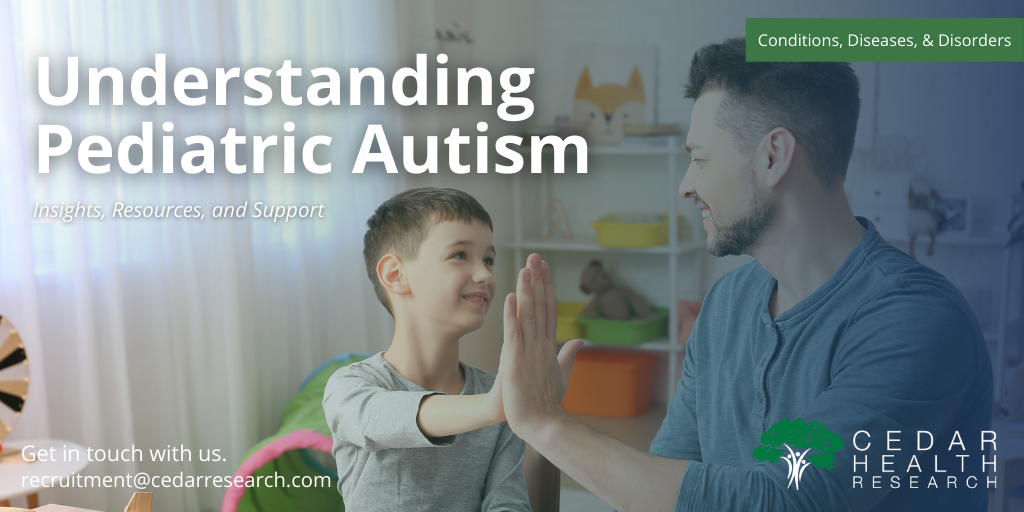Welcome to the Cedar Health Research blog, where we will delve into the complex world of autism in children. In this space, we aim to provide you with the latest insights, research findings, and practical information related to autism spectrum disorder (ASD) in young individuals. With a deep commitment to understanding and supporting the unique needs of children with autism, we hope that you learn the complexity of this disorder and are equipped with valuable knowledge about the impacts of autism as well as current opportunities in clinical trials.
Introduction to Autism Spectrum Disorder
Autism, a neurodevelopmental disorder, is a fascinating and complex topic that has captured the attention of researchers, clinicians, and society as a whole. Characterized most often by difficulties in social interaction, communication, and restricted interests and repetitive behaviors, autism affects millions of children worldwide. While the condition presents unique challenges, it’s essential to foster a deeper understanding of autism and promote an inclusive and supportive environment for children on the spectrum. In this blog, we will explore the key aspects of autism, how it affects our children, and how science is working towards new therapies through Clinical Trials.
Understanding Autism Spectrum Disorder (ASD)
Autism Spectrum Disorder is a broad term that encompasses a range of conditions, each with its own unique presentation. Some individuals with autism may exhibit exceptional abilities in areas such as mathematics or music, while others may struggle with sensory sensitivities or speech difficulties.
It is crucial to recognize that autism is a spectrum, and each child’s experience is distinct.
Autism typically manifests during early childhood, affecting boys more frequently than girls. It is estimated that about 1 in 54 children in the United States has autism spectrum disorder (ASD), according to the Centers for Disease Control and Prevention (CDC). However, it is important to note that autism can be diagnosed in individuals of any age, and the symptoms and challenges may evolve over time. Autism not only impacts the individual diagnosed with ASD but also has a profound effect on their families. Parents and siblings often face unique challenges in understanding and supporting their loved ones with autism. They may need to adapt routines, seek specialized services, and provide additional care and attention.
How Autism Impacts Children
Children with autism often face challenges in many ways. Whether it’s through communication or in social situations, difficulties can lead to feelings of isolation and frustration. It is important to remember that while some children may prefer solitude, others may desire social connections but struggle to initiate or sustain them due to social impairments. Here will see a collection of areas where children with autism may struggle:
- Social interactions
- Recognizing and interpreting social cues
- Making eye contact, and engaging in reciprocal communication
- Sensory sensitivities: hypersensitive or hyposensitive to sensory stimuli such as sound, touch, taste, smell, or visual input
- Loud noises, bright lights, certain textures, or crowded spaces may cause distress or discomfort
- Repetitive behaviors and restricted interests are common characteristics of autism
- Repetitive movements, such as hand-flapping or rocking, or adhere rigidly to specific routines or rituals
Recognizing and understanding these challenges is crucial for creating inclusive environments and providing appropriate support and interventions. By fostering acceptance, promoting understanding, and tailoring interventions to individual needs, we can empower children with autism to reach their full potential and lead fulfilling lives.
Trials, Support, and Resources for Autism
While there is no current cure for autism spectrum disorder (ASD), there are various treatments and interventions available that can help individuals with autism manage their symptoms, enhance their quality of life, and promote their development. It’s important to note that the effectiveness of treatments can vary depending on the individual, as autism can present with a wide variety of conditions.
Clinical trials play a vital role in advancing our understanding of autism and developing new interventions and treatments. Participation in clinical trials allows individuals with autism and their families to contribute to scientific research and potentially access innovative therapies.
Cedar Health Research is proud to be at the forefront of autism research and actively enrolling participants for this important clinical trial. Through clinical trials, we strive to uncover innovative treatments, advance scientific knowledge, and improve the lives of individuals with autism and their families. If you are interested in participating or wish to learn more about the trial, contact our research team today. You can receive compensation for your time commitment to our trials. Together, we can make a difference in the lives of those living with autism.
To learn more about Cedar Health Research and our Autism Clinical Trial or to see if your child is eligible for clinical research, please visit our site at the link below and sign up to speak to our Patient Education Team.
https://www.cedarhealthresearch.com/find-a-trial/dfw-east-trials/#!/study/57
To learn more about Autism visit one of our sources.
Source: The Centers for Disease Control & Prevention https://www.cdc.gov/ncbddd/autism/index.html
Source: The National Autism Association https://nationalautismassociation.org/







